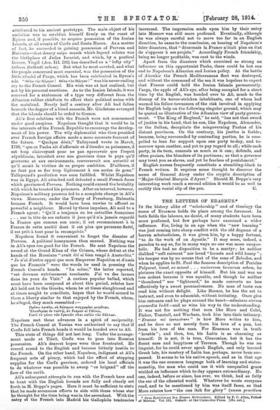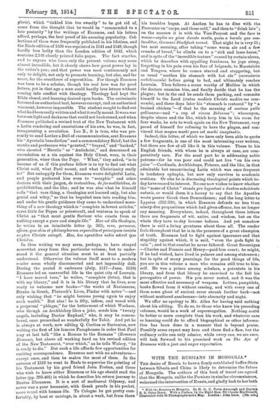THE LETTERS OF ERASMUS.*
Le the history alike of "scholarship" and of theology the name of Erasmus holds its place among the foremost. In both fields the labours, no doubt, of many students have been more profound, but few perhaps have exercised a wider influence. For, living in an age when the "new learning" was just coming into sharp conflict with the old dogmas of a barren scholasticism, it was given him, by a happy fortune, "to do the work of an Apostle." It may seem, indeed, a paradox to say so, for in many ways no one was more unapos- tolic. He had no disposition to be a martyr ; he neither disliked "soft raiment" nor loved "locusts and wild honey " ; his temper was by no means that of the sons of Zebedee, and when he applies to St. Paul the famous description of Pericles Fulgural, tonat, ac ?niece( . . . universum terror= orbem, he pictures the exact opposite of himself. But his zeal was no less ardent because it was equable, and though he neither " thundeted " nor "lightened," he made converts no less effectively by a sweet persuasiveness. No man of taste can read hid] without delight. Like Horace, he has the art to instruct, and even to admonish, without irritating. Once give him entranbe and he plays around the beart—acimissus eireum prmeordia ludit—and no ivies his way to the understanding. It was not for nothing that men like More and Colet, Fisher, Tunstall, and Warham, took him into their intimacy. "Emma mi Ipaerptzkrerre" is hOW More Writes to him, and he does so not merely from his love of a pun, but from his love of the man. For Erasmus was in truth "lovable"; and then, too, his Latin is as charming as himself, It is not, it is true, Ciemonian, bat it has the fluent ease and happiness of Terence. Though he was no linguist, for he could never speak English, and only learned Greek late, his mastery of Latin has, perhaps, never been sur- passed. It seems to be his native speech, and as in that age it was the one common language both of learning and states- manship, the man who could use it with unequalled grace wielded an influence which to.day appears extraordinary. No one, indeed, before or since, has ever, we think, had so fully the ear of the educated world. Whatever he wrote everyone read, and to be mentioned by him was itself fame, so that More relates how "the one itch for glory" (lomat prurigurn • Opus Epistoler umOn. Erosmi Eolterodami. Edited by P.O. Allen, Pane* of Merton. Vol. III. Oxford: at the Clarendon Press. [I13e. net.]
glorie), which "tickled him too sweetly" to be got rid of, came from the thought that Linwould be "commended to a late posterity" by the writings of Erasmus, and his letters afford, perhaps, the best proof of his amazing popularity. Col- lections of them were frequently published in his lifetime, and the Basle edition of 1538 was reprinted in 1541 and 1548, though hardly less bulky than the London edition of 1642, which contains 2,146 closely printed folio pages. The fact startles, and to anyone who faces only the present volume may seem almost incredible, but it clearly shows how great power lay in the writer's pen ; and that power was used continuously not only to delight, not only to promote learning, but also, and far more, for the overthrow of superstition. For though Erasmus was born to be a scholar, though his real love was for good letters, yet in that age a man could hardly love letters without coming into conflict with theology. Theology had kept the Bible eloeed, and learning desired open books. The ecclesiastic favoured an authorized text, however corrupt, and an authorized comment, however impossible. The student sought to find out what bad been really written and what it really meant. Itwas a war between light and darkness that could not be shunned, and when Erasmus published a revised text of the New Testament with a Latin rendering and annotations of his own, he was, in fact, inaugurating a revolution. Leo X., it is true, who was pre- sently to send Luther a Bull of excommunication, sent Erasmus his "Apostolic benediction" and a commendatory Brief; but the monks and professors who "grunted," "brayed," and "barked," who shouted "Heretic" or "Antichrist," and denounced an emendation as a sin against the Holy Ghost, were, in their generation, wiser than the Pope. " What," they asked, "is to become of us if this profane fellow is to try to find out what Christ said, what Paul meant, and what Christianity really is?" But unhappily for them, Erasmus wrote delightful Latin, and people preferred him even to " seraphic " and other doctors with their jargon, de instants:bus, de formalitatibus, de guidditatibus, and the like; and he was also what he himself calls "that rare thing, a theologian not learned only, but also genial and witty," so that he beguiled men into reading him, and under his gentle guidance they came to understand some- thing of a new theology which is " complete in fewest articles," cares little for Popes or priestcraft, and ventures to speak of Christ as "that most gentle Saviour who exacts from us nothing except a pure and simple life." Hire est ills theologies, he writes in an inimitable letter (p. 361), Tara, germana, efficax, gun slim -et philosophorum supercilia et principuns invicta sceptre Christo subegit. Hoc, hoc agentibus nobis aderit ipse Christus.
In thus writing we may seem, perhaps, to have strayed somewhat away from this particular volume; but to under- stand it the general situation must be at least partially understood. Otherwise the volume itself must to a modern reader seem wholly disconnected and not impossibly dulL During the period it embraces (July, 1517—June, 1519) Erasmus led an uneventful life in the quiet city of Louvain. "I have moved here," he writes, "complete (lotus), that is with my library," and it is in his library that he lives, ever ready to welcome new books—" the works of Nazianzene, Strobe in Greek, Plutarch's Lives, Pinder with notes "—and only wishing that " be might become young again to enjoy such wealth." But alas ! he is fifty, infirm, and vexed with a perpetual "phlegm," for the betterment of which Warham, who though an Archbishop likes a joke, sends him "twenty angels, including Doctor Raphael," who, it may be remem- bered, once prescribed so wonderfully for Tobit. And yet he is always at work, now editing Q. Curtius or Suetoniue, now writing the first of his famous Paraphrases in order that Paul may at last talk "like a Roman to the Romans" (Romanis Romans), but above all working hard on his revised edition of the New Testament, "over which," as he tells Wolsey, "he is ready to die." But such a life affords few opportunities for exciting correspondence. Erasmus met with no adventures— except once, and then he makes the most of them. In the autumn of 1518 he went to Basle to supervise the printing of his Testament by his good friend John Froben, and those who wish to know either Erasmus or his age should read the letter (pp. 393-401) in which he describes his return journey to Beanie; Rhenontts. It is a sort of mediaeval Odyssey, and never was a poor humanist, with Greek proofs in his pocket, 'more vexed with human ills. To Cologne be got pretty com- fortably, by boat or carriage, in about a week, but from there his troubles began. At Aachen be bee to dine with the Precentor on "carps, and those cold," and then to "drink late"; on the morrow it is with the Vice-Provost and the fare is worse—erpleo me risco durato yenta, pens a baud° quo con- tunditur, German Stockfisch recant. That night he is very ill; but next morning, after taking "some warm ale and a few crumbs of bread," Le climbs on to a "sick and lame horse," and in spite of the "incredible torture" caused by certain ulcers, which he describes with appalling frankness, be jogs along, forgetting in his pain even his fear of brigands, to Maestricht and Tongres, where he comes starved and staggering, but as usual "soothes his stomach with hot ale" (cervisiaria sarbitiuncula) before going to bed, and ultimately reaches Louvain. Then follows a scene worthy of Moliere in which the doctors examine him, and finally decide that he has the plague ; but in the end he sends them packing, and commits himself to the Lord (iratus medicia Christ° medico me com- mando), and three days later his "stomach is restored" by "a braised chicken "—if that be the meaning of contuse pallo gallinaceo—and "a cup of vinum Belnense"; whereupon, despite ulcers and the like, which keep him in his room for four weeks, be seta to work again on the New Testament, very proud of himself for refusing to have the plague, and con; vinced that magna morbi pars est morbi insaginatio.
Indeed, this letter, of which we have only been able to quote a few fragments, is one of the most interesting ever written, lint there are few at all like it in this volume. Those to his English friends, with whom he is always at ease, are com- paratively rare. For the most part he is addressing noble patrons—for he was poor and could not live "on his own juice "—Cardinals, Archbishops, Princes, and the like, in that admirable but unconvincing Latin which was once frequent in:laudatory epitaphs, but now only survives in academie orations. Or else be is discussing theological points which to- day have ceased to interest. No one now wishes to know whether the "name of Christ" stands pro ltypostasi e &tabus subeistente naturis, or would deem it a heresy to say that the Apostles wrote poorer Greek than Demosthenes; and the long letter to Lypsius (312-330), in which Erasmus defends no less than ninety-five propositions which had given offence, has no longer any meaning. Everywhere, indeed, throughout these letters there are fragments of wit, satire, and wisdom, but on the whole they have to-day become tedious. And yet somehow there is still a living greatness about them all. The reader feels throughout that he is in the presence of a great champion of truth. Erasmus had to fight against ignorance and that stupidity against which, it is said, "even the gods fight in vain" ; and in that combat he never faltered. Great Sovereigni —Charles and Francis and Henry—paid him court; he might, if he had wished, have lived in palaces and among statesmen; but in spite of many yearnings for the good things of life, you see in this volume a man who remains still true to him- self. He was a prince among scholars, a potentate in his library, and from that library he exercised to the full his prerogative of power. His pen never rested, and it was the most effective and necessary of weapons. Letters, pamphlets, books flowed from it without ceasing, and with every one of them come ghost of ancient error shrank further back—not without muttered anathemas—into obscurity and night.
We offer no apology to Mr. Allen for having Said nothing about his editing. To do so, to those who know his preceding volumes, would be a work of supererogation. Nothing could be better or more complete than his work, and whatever care or learning could do to afford biographical or other informa- tion has been done in a manner that is beyond praise. Possibly some expert may here and there find a flaw, but the ordinary critic can only admire, while every one, we are sure, will look forward to his promised work on The Age of Erasmus with a just and eager expectation.















































 Previous page
Previous page